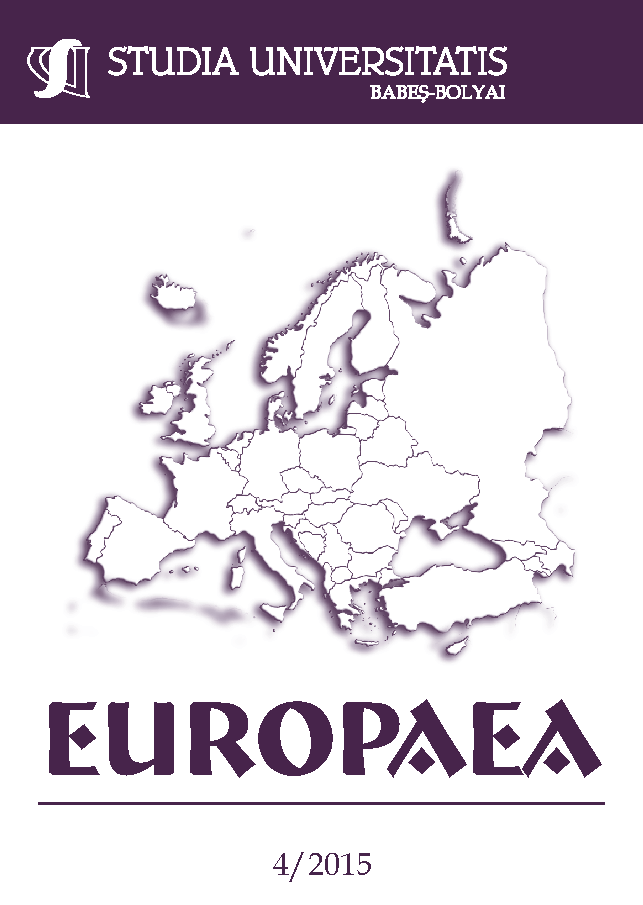EUROPE 2020 STRATEGY - RESPONDING TO (UN)EMPLOYMENT WITH EDUCATION
Keywords:
Europe 2020, education, internationalisation, employment, brain drain, RomaniaAbstract
In this article, we analyse the response that education strategies and student mobility programmes can offer to the requirements of the Europe 2020 strategy. The main aspects brought forward are the current results obtained in the domains of education and employment, the outcomes of the mobility programmes and the issue of brain drain, with particular emphasis placed on Romania’s situation from these perspectives.
References
Babeș-Bolyai University of Cluj-Napoca official website, accessed on 03.11.2015 at: [http://centre.ubbcluj.ro/fundraising/].
Creangă, Claudiu (2014), official website Erasmus-plus.ro, Movement in EU: Countries to where the European brains move, 27 August 2014, accessed on 03.11.2015 at: [http://erasmus-plus.ro/movement-in-eu-countries-european-brains/].
Curaj, Adrian; Deca, Ligia and Hâj, Cezar-Mihai (2015), “Romanian Higher Education in 2009–2013. The Bologna Process and Romanian Priorities in the Search for an Active European and Global Presence”, in Adrian Curaj et alii (editors), Editors Higher Education Reforms in Romania. Between the Bologna Process and National Challenges, Heidelberg: Springer, 1-24.
Deca, Ligia; Egron-Polak, Eva and Fiţ, Cristina Ramona (2015), “Internationalisation of Higher Education in Romanian National and Institutional Contexts”, in Adrian Curaj et alii (editors), Editors Higher Education Reforms in Romania. Between the Bologna Process and National Challenges, Heidelberg: Springer, 127-148.
European Commission - Press release, State of Play: Measures to Address the Refugee Crisis, 4 November 2015, accessed on 03.11.2015 at: [http://europa.eu/rapid/press-release_IP-15-5958_en.htm].
European Commission (2010), Europe 2020 - A strategy for smart, sustainable and inclusive growth, Brussels, accessed on 03.11.2015 at: [http://ec.europa.eu/eu2020/pdf/COMPLET%20EN%20BARROSO%20%20%20007%20-%20Europe%202020%20-%20EN%20version.pdf].
European Commission (2014), The Erasmus Impact Study. Effects of mobility on the skills and employability of students and the internationalisation of higher education institutions, Luxembourg: Publications Office of the European Union.
European Commission - Press release (2014), Erasmus Impact Study confirms EU student exchange scheme boosts employability and job mobility, 22 September 2014, accessed on 11.11.2015 at: [http://europa.eu/rapid/press-release_IP-14-1025_en.htm].
Eurostat statistics, Youth employment from 20 to 29 years, accessed on 20.11.2015 at: [http://appsso.eurostat.ec.europa.eu/nui/submit ViewTableAction.do].
Eurostat statistics, Europe 2020 indicators, accessed on 01.11. 2015 at: [http://ec.europa.eu/eurostat/web/europe-2020-indicators].
Government of Romania, National Reform Programme 2015, Bucharest, April 2015, accessed on 02.10.2015 at: [http://ec.europa.eu/europe2020/pdf/csr2015/nrp2015_romania_en.pdf.
Government of Romania, Ministry of Education and Research, The National Plan for Research, Development and Innovation for the period 2007-2013, accessed on 15.11.2015 at: [http://www.euraxess.gov.ro/plan_EN.pdf].
Istaiteyeh, Rasha (2011), Economic Development and Highly Skilled Returnees: The impact of human capital circular migration on the economy of origin countries: The case of Jordan, Kassel, Kassel University Press.
Ivan, Claudiu and Rostaș, Iulius (2013), Early School Leaving: causes and consequence, Roma Education Fund, accessed on 15.11.2015 at: [http://www.romaeducationfund.hu/sites/default/files/publications/early_school_leaving_causes_and_effects_2013.pdf].
Luț, Dina Maria (2012), “Romanian Education and Training System in the Context of European Strategic Framework: a Comparative Analysis”, in Anale. Seria Stiinte Economice, vol. XVIII/Supplement, Timișoara: Eurostampa, 255-263.
Mathiassen, Rikke (2014), Expert: Erasmus programme causes “brain drain”, October 9, 2014, Euroscope, accessed on 03.11.2015 at: [http://publications.europeintheworld.com/expert-student-exchange-encourages-young-brains-flee-southern-europe/].
Ministry of National Education and Scientific Research, National Centre for Recognition and Equivalence of Diplomas, accessed on 10.10. 2015 at: [http://cnred.edu.ro/en/#recognition-of-studies-for-admission-to-university-in-Romania].
Negricea, Costel; Dumitru, Nicoleta and Edu, Tudor (2011), "Betwen Hope and Reality the Role of Romanian Universities in the Student Employer Relationship," in Holistic Marketing Management Journal, Holistic Marketing Management, vol. 1(1), 52-59.
Official Journal of the European Union, Council Recommendation of 14 July 2015 on the 2015 National Reform Programme of Romania and delivering a Council opinion on the 2015 Convergence Programme of Romania, 18.08.2015, accessed on 03.11.2015 at: [http://ec.europa.eu/europe2020/pdf/csr2015/csr2015_council_romania_en.pdf].
Oxford Dictionaries, accessed on 03.11.2015 at: [http://www.oxforddictionaries.com/definition/english/brain-drain].
Sweeney, Simon (2012), Going Mobile: Internationalisation, mobility and the European Higher Education Area, York: Higher Education Academy, accessed on 03.11.2015 at: [https://www.heacademy.ac.uk /sites/default/files/resources/going_mobile.pdf].
The Gallup Organization (2010), Employers’ perception of graduate employability, Flash Eurobarometer study requested by the European Commission, November 2010, accessed on 15.11.2015 at: [http://ec.europa.eu/public_opinion/flash/fl_304_en.pdf].
The World Bank, press release (2015), Romania Launches Project to Increase Students’ Chances of Successfully Transitioning to Tertiary Education, 3 December 2015, accessed on 15.11.2015 at: [http://www.worldbank.org/en/news/press-release/2015/12/03/romania-launches-project-to-increase-students-chances-of-successfully-transitioning-to-tertiary-education].
University of Bucharest official website, accessed on 03.11.2015 at: [http://infoub.unibuc.ro/index.php/cariera].
Varly, Pierre; Iosifescu, Constantin-Șerban; Fartusnic, Ciprian; Andrei, Tudorel; Herțeliu, Claudiu (2014), Final report for UNICEF, Cost of non-investment in Education in Romania, Bucharest, November 2014, accessed on 04.11.2015 at: [http://www.unicef.org/romania/ Cost.Noninvest.web.pdf].
Downloads
Published
How to Cite
Issue
Section
License
Copyright (c) 2015 Studia Universitatis Babeș-Bolyai Europaea

This work is licensed under a Creative Commons Attribution-NonCommercial-NoDerivatives 4.0 International License.



